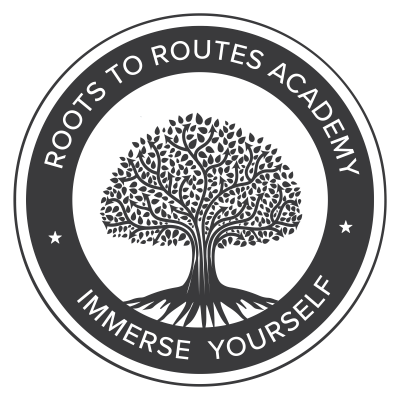Tutoring Isn’t Enough: What Makes the Different for Students to Thrive
February 10, 2025

Imagine this: Your child comes home from school, frustrated and disheartened. Despite attending regular tutoring sessions, their grades in math aren’t improving, and their confidence is dwindling. As a parent, you feel helpless, questioning why traditional tutoring isn’t bridging the gap. This scenario is all too familiar for many Black families in Ontario.
The truth is, while tutoring aims to address immediate academic challenges, it often falls short of tackling the deeper, systemic issues that hinder Black students’ success. Factors such as cultural disconnects, lack of representation, and systemic biases in the education system play significant roles. Recognizing these challenges, Roots to Routes Academy offers a transformative approach that goes beyond conventional tutoring. Our program is designed to empower Black high school students by providing a culturally relevant, personalized, and supportive learning environment.
Before we delve any further, I would like to point out why tutoring in itself is not enough to help your child with their academics by discussing a concept called the tutor trap.
The Tutor Trap: Why Tutoring Isn’t Enough
Many parents turn to tutoring as the go-to solution when their child struggles in school. It seems like the logical step—find a tutor, get extra help, and watch your child’s grades improve. But what happens when this doesn’t work?
This is where the tutor trap comes in.
The tutor trap is a cycle where students are placed in tutoring because they struggle with a subject, but instead of addressing the root causes of their struggles, they are simply given more academic work to complete. This additional workload can lead to frustration, burnout, and even lower self-confidence.
Instead of making learning easier and more engaging, traditional tutoring often makes it harder and more overwhelming. Here’s how the trap works:
- A student struggles in a subject – This is often due to gaps in foundational knowledge, disengagement, lack of confidence, or systemic issues within the school system.
- Tutoring is introduced as a solution – The student is given extra classes, worksheets, and homework, increasing their workload rather than fixing the actual problem.
- The student experiences burnout – Because the root causes of their academic struggles aren’t being addressed, the student continues to struggle, leading to frustration and even worse performance.
- Parents and students lose faith in education – When traditional tutoring fails, parents may feel helpless, and students may start believing they are simply “not good at” a subject like math.
A 2017 study from the Education Policy Institute found that while tutoring can help with short-term academic gains, it does not significantly close the long-term achievement gap—especially for students who already feel disconnected from the curriculum. This is because tutoring typically focuses on re-teaching content rather than addressing why the student struggled in the first place.
For Black students, the tutor trap can be even more damaging. Traditional tutoring often lacks cultural relevance, meaning the material being taught still doesn’t feel engaging or meaningful. Without teachers who understand the unique challenges Black students face in the education system, tutoring becomes just another layer of schooling rather than a true solution.
Breaking Free from the Tutor Trap: What’s the Real Solution?
Rather than piling on more work, the real solution is personalized, culturally responsive education that gets to the heart of why a student is struggling. That’s where Roots to Routes Academy comes in.
Our program doesn’t just add more homework—we transform how students learn by:
- Identifying the root causes of academic challenges.
- Providing mentorship and cultural affirmation to build confidence.
- Making learning engaging and relevant so students actually enjoy the subject.
- Offering personalized learning so students aren’t forced into a “one-size-fits-all” approach.
Roots to Routes Academy understands that Black students don’t need more academic pressure—they need a different, better way of learning. Instead of making students feel like they are the problem, we change the system around them to ensure they thrive. This is how we achieve this:
1. Personalized Learning: Meeting Students Where They Are
At Roots to Routes Academy, we understand that each student is unique, with individual strengths, challenges, and learning styles. Our personalized learning approach ensures that we meet students where they are, tailoring our teaching methods to their specific needs.
We begin by conducting comprehensive assessments to identify each student’s academic standing, learning preferences, and areas requiring support. Based on these insights, we develop customized learning plans that align with their goals and interests.
For example, if a student struggles with algebra but excels in geometry, our educators will allocate more time to reinforce algebraic concepts while continuing to challenge them in geometry. This targeted approach ensures that students build a solid foundation in all areas of math.
Additionally, our small class sizes and one-on-one mentorship opportunities allow for individualized attention. This setup fosters a supportive environment where students feel comfortable asking questions, expressing concerns, and celebrating their achievements.
2. Experienced Educators Who Understand Black Students
Representation matters. Having educators who share cultural backgrounds and experiences with their students can significantly impact learning outcomes. A study from Johns Hopkins University found that Black students who had at least one Black teacher by third grade were 13% more likely to enroll in college.
At Roots to Routes Academy, our team comprises experienced Black educators who are not only experts in their subjects but also serve as mentors and role models. They understand the unique challenges that Black students may face, both inside and outside the classroom, and are equipped to provide guidance and support.
Our educators employ culturally responsive teaching methods, integrating examples and references that resonate with Black students. This approach not only makes learning more engaging but also helps students see themselves reflected in the curriculum, fostering a sense of pride and belonging.

3. Cultural Relevance: Learning That Reflects Identity
Many Black students feel disconnected from a curriculum that doesn’t reflect their history, culture, or experiences. This disconnect can lead to disengagement and a lack of interest in academic pursuits.
Roots to Routes Academy addresses this by offering a curriculum designed by Black educators for Black students. We incorporate Black history, literature, and contributions into our lessons, ensuring that students see their identities represented.
For instance, in our math classes, we highlight the achievements of Black mathematicians and scientists, demonstrating the significant contributions they’ve made to the field. This not only enriches the learning experience but also inspires students to envision themselves in these roles.
By making the curriculum culturally relevant, we help students develop a deeper connection to the material, increasing engagement and motivation.
4. Proven Success: How Roots to Routes Academy Changes Lives
The effectiveness of our approach is evident in the success stories of our students. Take, for example, Sarah, a Grade 10 student who struggled with math and felt disconnected in her traditional school environment. After enrolling in Roots to Routes Academy, she received personalized instruction tailored to her learning style and was taught by educators who understood her cultural background.
Within a few months, Sarah’s math grades improved significantly, and more importantly, she developed a newfound confidence in her abilities. She began participating more actively in class and even started tutoring her peers, becoming a role model herself.
Our commitment to cultural relevance and personalized learning has led to numerous such success stories. Parents have reported not only academic improvements in their children but also enhanced self-esteem and a greater sense of identity.
Conclusion
Traditional tutoring addresses surface-level academic issues but often fails to tackle the deeper, systemic challenges that Black students face. Roots to Routes Academy offers a comprehensive solution, providing personalized learning, experienced educators, and a culturally relevant curriculum that empowers Black high school students to thrive.
As a parent, you want the best for your child’s education and future. Don’t settle for temporary fixes. Choose a program that understands and addresses the unique needs of Black students. Enroll your child in Roots to Routes Academy today and witness the transformative impact of an education that celebrates and uplifts their identity.
For more information and to register, visit our website at www.rootstoroutes.ca. Let’s work together to ensure your child’s academic success and personal growth.
![]()
Related Posts
We’re So Glad You Made It Here
We know you might still have a few questions or concerns and that’s completely okay. We’re here to listen, to support, and to make sure you have all the information you need.
If something’s on your mind, don’t hesitate to reach out. Just send us a quick message, we’re happy to help.
Once you do, a member of our team will get back to you shortly and you’ll also start receiving our free, value-packed newsletters filled with tips, resources, and insights to support your child’s learning journey.

